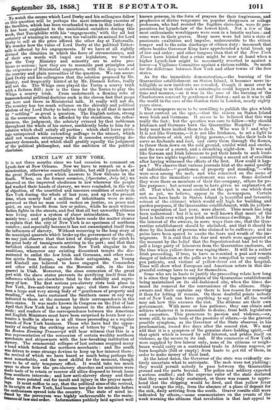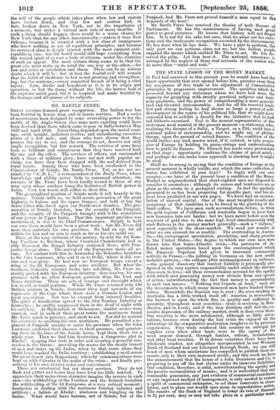LYNCH JAW AT NEW YORK.
1T is not three months since we had occasion to comment on Lynch-law at New Orleans. Now we have to remark on a de-
monstration, otherwise essentially unlike, but still Lynch-law' at
the great Northern port which answers to New Orleans in the South. When, on the former occasion, (Spectator, July 3d,) we
observed on the improved obedience to law wherever the people had washed their hands of slavery, we were reminded, in the way of objection, of the unsettled and insecure condition of society in New York during the wholh of last year, and up to the present time, when nearly half a million of inhabitants were so mis- governed as that no man could reckon on justice, on peace and quiet, on any benefit from law or police while he must witness faction fights in the streets, and feel that ;11 but unworthy citizens were living under a system of sheer intimidation. This was mainly true ; and perhaps it might have made the matter clearer to explain that the city of New York is no specimen of northern societies ; and especially because it has not emancipated itself from the influences of slavery. Without recurring to the long story: of the municipal quarrels which broke up the government of the city, we may just observe that that kind of dispute gives the pitch to the great body of immigrants arriving in the port; and that that turbulent element at once renders New York singular in its conditions, whenever any existing discontent tempts the dis- contented to enlist the low Irish and Germans and other rest- less spirits from Europe, against their antagonists, as Young and Kimball are believed to have engaged the Comimehes and other wild Indians on the Mormon side, in the late quarrel in Utah. Moreover, the close connexion of the great port with the slave states prevents its purifying itself from the influences which are elsewhere fatal to the stability and supre- macy of law. The first serious pro-slavery riots took place in New York, five-and-twenty years ago ; and there has always been a large and very strong body of "gentlemen of property and Mending,' who, have sustained the Southern cause in any way indicated to them at the moment by their correspondents in the
i
slave-states. It was made known n Congress on the 21st of last April that New York had a large interest in the African slave- trade ; and readers of the correspondence between the American and English Ministers must have been surprised to learn how ex- tensive a traffic in slaves is at all times proceeding as a regular branch of New York business. Those who have had the oppor- tunity of reading the striking series of letters by " Sigma " in the Boston Evening Transcript will bear witness that this is a true representation of the connexion of certain wealthy northern merchants and shipowners with the law-breaking institution of slavery. The commercial collapse of last autumn snapped many a bond which fettered the northern merchants : and the south Was driven to some strange devices to keep up her interest there ; the revival of which we have heard so much being perhaps the most remarkable, and the most skilful for the moment, though sure to be of only temporary effect. It would take too much space to show how the pro-slavery churches and ministers were made tools of to retain or recover old allies disposed to break loose from southern interests ; and how anti-slavery clergy and their !lochs were pointed out for insult and injury in the prayer meet- pige. It must suffice to say, that the political aims of the revival, ?1t. its origin at New York, had become too plain for mistake before t.he enthusiasm spread into the country. The state of mind in- anced by the paroxysm was highly unfavourable to the main- tenance of law and order. Informations publicly laid against well
known persons in the form of prayers for their forgivene,-,, and prophecies of divine vengeance on popular clergymen or colkge professors, who had resisted the fugitive slave-law, were fit pre. paratives for Lynch-law of the lowest kind. Not a few of the most enthusiastic worshippers were soon in a lunatic asylum ; and some were in their graves. Many more were led into a state of passionate exaltation and impulse, unfavourable to the citizen temper and to the calm discharge of citizen duty : insomuch that others besides Governor King have apprehended a total break up of law and order ; and other tongues than that of the New York Times have hinted that a crisis might be near at hand when a higher Lynch-law might be necessarily resorted to against a lower—a Vigilance Committee against a riotous rabble. So much for the difference between New York and other towns of the free states.
As for the immediate demonstration,—the burning of the Quarantine establishment on Staten Island, it becomes more in- telligible as new incidents are revealed, though it must ever be astonishing to us that such a catastrophe could happen in such a time and manner,—as it was in the ease of the burning of the Charlestown convent by gentlemen of Boston ; and as it was to all the world in the case of the Gordon riots in London, nearly eighty years since.
The newspapers seem to be unwilling to publish the plea which is most current on the spot,—that the rioters on Staten Island were Irish and Germans. It seems to be believed that this was really the feet: but the question was sure to follow—why should Irishmen and Germans burn the Quarantine Hospital? Some- body must have incited them to do it. Who was it ? and why ? It is not like Germans,—it is not like Irishmen, to set a light to the chambers of sick and dying persons,—to take their beds to serve as firebands and fuel, and carry them through the flames, to throw them down on the cold ground, amidst wind and smoke, and the roar of a crowd, and a drenching night-dew. It was not like German and Irish labourers to put their hands to such busi- ness for two nights together; committing a second set of cruelties after having witnessed the effects of the first. How could it hap- pen ? We observe that various journals hint at the social quality of individuals—" gentlemen of property and standing,"—who were seen among the mob, and who remained on the scene of ruin after the immediate excitement was over. Some declared they were there as members of their fire-company, others for po- lice purposes : but several seem to have given no explanation at all. That which is most credited on the spot is one which does not as yet, we believe, appear in the newspapers. Certain rich men have lands in Staten Island (a beautiful and favourite retreat of the citizens) which would sell high for building and garden purposes, if the Quarantine establishment, with its yellow- fever reputation of last year, were absent. Thus much has long been understood : but it is not so well known that much of the land is built over with poor Irish and German dwellings. It is for the interest of the owners, in more ways than one, that the Qua- rantine establishment should be abolished, and that it should be done by the hands of persons who claimed to be sufferers ; and no pains have been spared to excite the fears and wrath of the im- migrants. It is said that the fear and wrath were aggravated at the moment by the belief that the Superintendent had led to the poll a large party of labourers from the Quarantine enclosure, at the time when yellow-fever was raging there. It will be a rather Irish proceeding, if true, to have so resented a past and remote danger of infection at the polls as to be compelled to carry small- pox patients, and victims of yellow-fever out of the hospital. Time will show what European and American actors in this dis- graceful outrage have to say. for themselves. Some who are in haste to Justify the proceeding relate how long it is since they began to complain of the Quarantine establishment being maintained on its old-fashioned site, when the times de- mand its removal for the convenience of the citizens. Ship- owners and their captains say there is less reason for removing it than for letting it remain. On these doubtful points nobody out of New York can have anything to say; but all the world may ask how this excuses the riot. The citizens are their own government. With more or less patience, they can obtain and achieve whatever it is reasonable to desire, from both legislature and executive. This proneness to passion and violence,—or, worse still, to make tools of the passions of others,—is the gravest possible symptom, as the Governor of the State observes in his proclamation, issued five days after the second riot. We may add that it is a symptom of the genuine slave- holding spirit,—of that spirit which is roused by self interest, and prides itself on violence, as the means to its end. If the commerce of New York were supplied by free labour only, none of its citizens or neigh- bours would carry on a contraband trade in African negroes, or burn hospitals (full or empty) from haste to get rid of them, in order to make money of their land.
At the latest dates, the Governor of the state was evidently en- tirely uncertain what to anticipate. The mob were not yielding : they would permit nobody to pass between the Quarantine ground and the parts beyond. The police and soldiery expected a serious conflict ; and the supreme ruler of the state declared that they must be duly sustained, or there was reason to appre- hend that the shipping would be fired, and that yellow fever would ravage the city, from the absence of a place of deposit for the sick, daily arriving from the south. Graver results still were indicated by others —some commentators on the events of the
week warning the citizens that revolution is that last appeal to
the will of the people which takes place when law and custom have broken down, and that law and custom had, in fact, broken down in New York, not in the impatience of a moment, but under a virtual mob rule of many months. If such a thing should happen, there would be a worse chance for New York than for any other American:city,—unless it were New Orleans, because it is crowded with a low class of immigrants who know nothing as yet of republican principles, and because its moneyed class is deeply tainted with the most eminent anti- republican vice : but the world would still hope everything from the roused spirit of so vast a body of citizens, under the stimulus of such an appeal. The most certain thing seems to be that the great city must make up its mind the one way or the other,—for law and order or revolution and chaos. There can be no serious doubt which it will be : but at best the fearful evil will remain that the habit of obedience to law is not growing and strengthen- ing, but the contrary,—every concerted breach of it being a vital injury. Law, divine and beneficent as it is in its origin and operation, is but the frame without the life, the barren half of the supreme social good, till it is inspired and made fruitful by the homage and allegiance of its subjects.



























 Previous page
Previous page